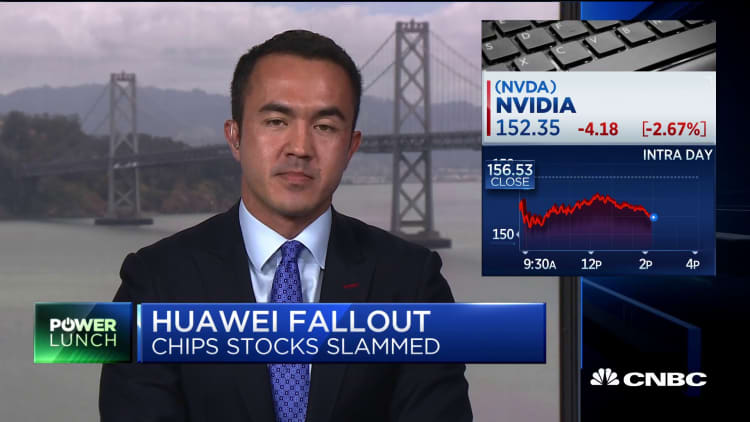
As chip stocks sell off on a report that semiconductor makers are cutting ties with China's Huawei, investors should consider buying up shares of Synopsis, AMD and Nvidia, RBC Capital Markets analyst Mitch Steves said Monday.
The VanEck Vectors Semiconductor ETF — which tracks the semiconductor's industry's biggest companies — has fallen 3.3% since the U.S. Commerce Department effectively blacklisted Huawei on Wednesday. Bloomberg reported late Sunday that Huawei suppliers, including Qualcomm, Broadcom, Intel and Xilinx, told employees they will not sell to the Chinese firm until further notice.
Huawei is the world's largest maker of networking equipment. Companies with high "smartphone exposure" or those relying heavily on growth in 5G such as Analog Devices or Skyworks Solutions will be impacted the most by the Trump administration's crackdown, Steves said.
Instead, Steves advised investors to "hide in high-tech stocks" like Synopsis, AMD and Nvidia because he said they are well insulated due to their investments in artificial intelligence and deep learning.
"You cannot do AI, you cannot do deep learning, you cannot do any high tech without those three companies," Steves said in an interview on CNBC's "Power Lunch."
He continued, "At the end of the day, if this really gets pushed to the end of the road, you're going to look at U.S. semiconductor high-tech stocks being better."
The Trump administration's actions on Huawei come as the U.S. attempts to strike a trade deal with China to end the escalating conflict. The world's two largest economies increased tariffs on one another this month, with the U.S. making the first move by increasing duties on $200 billion worth of Chinese products from 10% to 25%. China announced plans to raise tariffs rates on $60 billion in U.S. goods. The tactics amplified a fight that has rattled financial markets and threatened to drag on the global economy.


